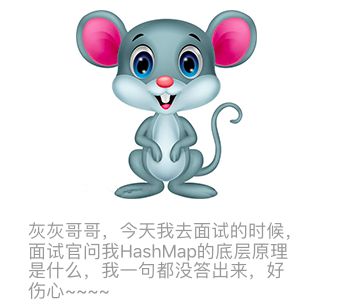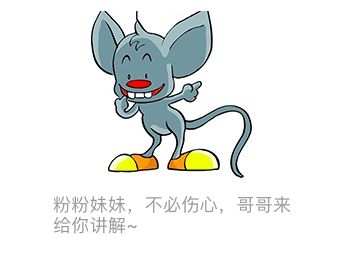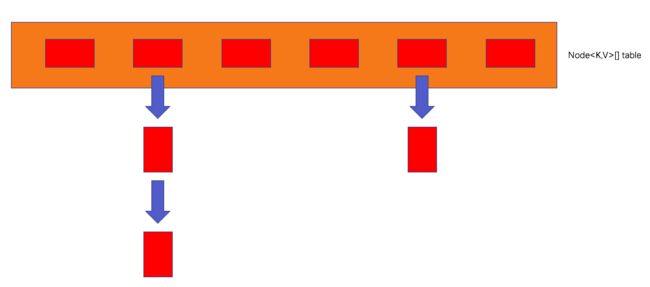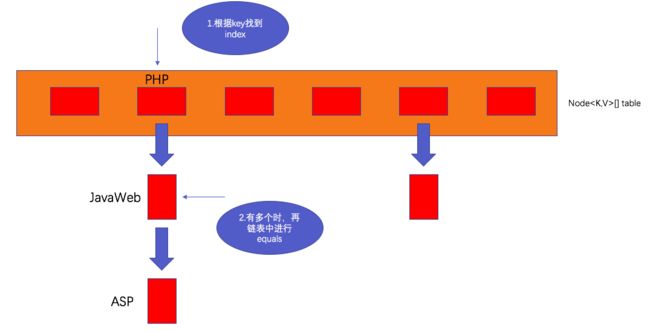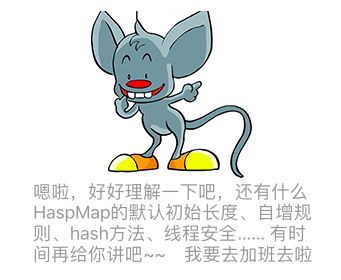今天小粉粉去某公司参加Java开发工程师的面试了。但是不太顺利,然后她遇见了小灰灰……
- HashMap的数据结构
- HashMap的数据结构是 数组+链表 的形式组成的。
- 数组(这个table就是咱们看见的数组部分。)
/**
* The table, initialized on first use, and resized as
* necessary. When allocated, length is always a power of two.
* (We also tolerate length zero in some operations to allow
* bootstrapping mechanics that are currently not needed.)
*/
/**
* 在第一次使用时初始化的表,并调整为
* 必要的。当分配时,长度总是2的幂。
* (在某些操作中,我们还可以容忍长度为0
* 目前不需要的引导机制。)
*/
transient Node[] table;
- 链表(在数组元素的内部)
/**
* Basic hash bin node, used for most entries. (See below for
* TreeNode subclass, and in LinkedHashMap for its Entry subclass.)
*/
/**
* 基本的哈希本节点,用于大多数条目。(见下文
* TreeNode子类,在LinkedHashMap中用于它的入口子类。)
*/
static class Node implements Map.Entry {
final int hash;
final K key;
V value;
// 指向下一个元素的引用(形成内部的链表)
Node next;
// …………
}
- put、get
- put:
先根据put进来的元素的key值对应的hash值得到这个元素应该存放在table中的位置(index)
把这个元素放入到index位置上。如果这个index上已经存放有其他元素了,那在同一个位子上的元素将以链表的形式存放,新加入的放在链头(头插法)
/**
* Implements Map.put and related methods
*
* @param hash hash for key
* @param key the key
* @param value the value to put
* @param onlyIfAbsent if true, don't change existing value
* @param evict if false, the table is in creation mode.
* @return previous value, or null if none
*/
final V putVal(int hash, K key, V value, boolean onlyIfAbsent,
boolean evict) {
Node[] tab; Node p; int n, i;
// 第一次使用table,初始化长度
if ((tab = table) == null || (n = tab.length) == 0)
n = (tab = resize()).length;
// 应该存放的位置的值是 null,那就直接把元素put到这个位置
if ((p = tab[i = (n - 1) & hash]) == null)
tab[i] = newNode(hash, key, value, null);
// 这个位置已经有元素存在了
else {
Node e; K k;
// 插入的key是一样的(直接替换掉)
if (p.hash == hash &&
((k = p.key) == key || (key != null && key.equals(k))))
e = p;
else if (p instanceof TreeNode)
e = ((TreeNode)p).putTreeVal(this, tab, hash, key, value);
else {
// 头插
for (int binCount = 0; ; ++binCount) {
if ((e = p.next) == null) {
p.next = newNode(hash, key, value, null);
if (binCount >= TREEIFY_THRESHOLD - 1) // -1 for 1st
treeifyBin(tab, hash);
break;
}
if (e.hash == hash &&
((k = e.key) == key || (key != null && key.equals(k))))
break;
p = e;
}
}
if (e != null) { // existing mapping for key
V oldValue = e.value;
if (!onlyIfAbsent || oldValue == null)
e.value = value;
afterNodeAccess(e);
return oldValue;
}
}
++modCount;
if (++size > threshold)
resize();
afterNodeInsertion(evict);
return null;
}
- get:
先根据get元素的key值对应的hash值得到这个元素应该存放在table中的位置(index)
再在这个index的元素的链表中去equals(key),如果相等的话,那就是要get的值(顺便一提:实现者认为后面插入的被查找的概率更大,所以使用了头插法)
欢迎加入交流群:451826376
更多信息:www.itcourse.top
完整教程PDF版本下载
